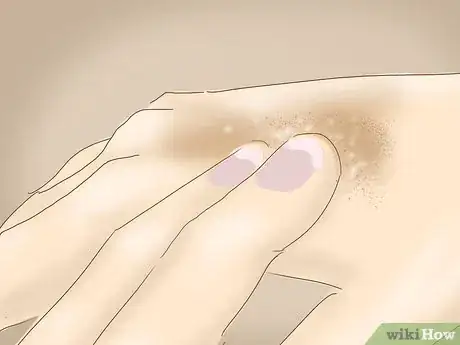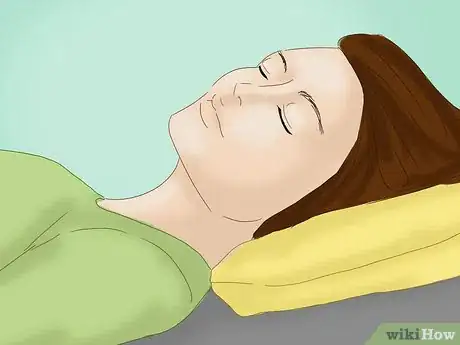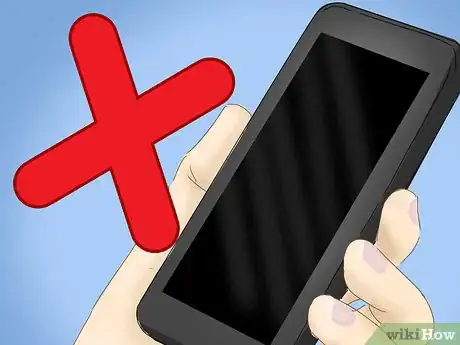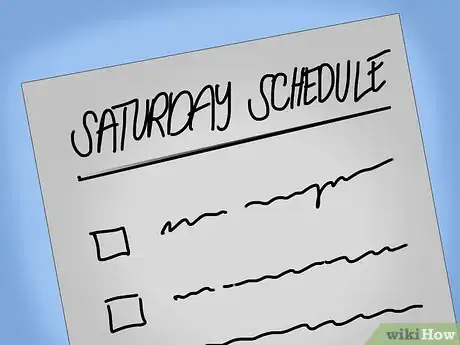This article was co-authored by Trudi Griffin, LPC, MS. Trudi Griffin is a Licensed Professional Counselor in Wisconsin specializing in Addictions and Mental Health. She provides therapy to people who struggle with addictions, mental health, and trauma in community health settings and private practice. She received her MS in Clinical Mental Health Counseling from Marquette University in 2011.
There are 18 references cited in this article, which can be found at the bottom of the page.
This article has been viewed 41,273 times.
Life is stressful, but it's also too short to spend in a constant state of physical, emotional and mental fatigue. If you've been feeling worn out lately, take the time to pause and recharge your batteries. The time and effort to do so will be well worth it. According to research published in Experimental and Therapeutic Medicine regular relaxation can soothe anxiety, improve your ability to focus, and lower you overall stress levels![1]
Steps
Recharge Physically
-
1Take a warm bath.[2] A long soak in a warm, relaxing bath can soothe the muscles in your body. Indulge in a bath at the end of a long day, even if you don't feel especially sore. By relaxing your muscles, you send signals to your body letting it know that the time has come to rest and relax. Triggering your body's relaxation mode before you go to sleep can make your sleep more restful, leaving you feeling thoroughly recharged in the morning.
- Alternatively, try taking a hot and cold shower. Hot-cold hydrotherapy is said to strengthen your body's immunity and improve its circulation. The improved circulation can make you feel refreshed.
- Take a hot shower like you usually do, then switch the temperature to cold and stay there for up to 30 seconds. Switch the water back to warm for another 30 seconds, then back to cold again for 30 more seconds before turning the water off.
-
2Use a simple scrub. When you wake up in the morning, use a body scrub on your feet and hands. Use an exfoliating scrub for your face as well. Scrubs can scrape away dead skin cells and improve circulation throughout your body. As a result, your body will end up feeling more energized than before.Advertisement
-
3Improve your eating habits. Eat lots of green, healthy vegetables, fruit, lean protein, good fats and whole grains. Filling your body with processed food, sugar, and alcohol can make you feel physically worn down. You do not need to cut out everything you enjoy from your diet, but limit unhealthy foods and focus on eating more nutritional meals and snacks.[3]
- Eat breakfast. Skipping breakfast will leave you feeling drained by mid-morning, and if you compound the problem by eating a small lunch at the office, you will struggle to make up for the nutrients you lost by the time you get home. Your breakfast should contain a balance of complex carbohydrates, protein, and a little fat.
-
4Stretch. Stretch for at least five minutes every hour throughout the day. Stretching makes you feel less stiff and worn down. Moreover, it improves your circulation immediately, giving you a quick jolt of energy as a result.
- Your stretches can be simple. For instance, try standing up, taking a deep breath and raising your arms above your head. Hold this pose for a few seconds before relaxing your arms and gradually bending forward at the waist. Then, gently roll your head forward and from side to side to loosen any stiffness in your neck.
-
5Get active.[4] Do an activity that you enjoy, such as taking a walk, running or swimming. The exercise you choose does not need to be vigorous or lengthy, but getting your body on the move for 10 to 30 minutes each day can cause your brain to release "happy" chemicals like serotonin,[5] adrenaline and endorphins[6] . As a result, your body and mind will both feel recharged.
- For an added bonus, try exercising outside. A short walk on a sunny day gives your body plenty of vitamin-D enriched sunlight, and spending time outdoors—especially in nature—often recharges the mind as well as the body.[7]
-
6Experiment with aromatherapy. Candles that contain essential oils are a good choice, or you can add a few drops of essential oil to your bathwater. Certain scents are believed to trigger a relaxation response in the body, while others may make your body feel more energized.
-
7Sleep more. Most adults only get five to six hours of sleep each night, while seven to nine hours are recommended for adults.[12] The best thing to do for your body is simply to increase the amount of sleep you get each night and "repay" your sleep debt.[13] Go to bed an hour early, if possible, for at least a week and notice the difference it makes.
- If you are unable to get that much additional sleep, try taking a 20-minute nap.[14] This amount of time prevents you from falling into a deep sleep but still treats your body to a little boost in energy.
-
8Relax at regular intervals. Take a break for 10 minutes every 90 minutes throughout the day. During this time, do something that relaxes you. Meditate, listen to music, play with a pet or practice a hobby.
- Make sure that the task you do during your break can be completed within that time period. Otherwise, you may find yourself feeling tense and distracted when you go back to work.
Recharge Emotionally
-
1Sing. Studies suggest that singing offers many of the emotional, mental and physical health benefits provided by exercise. Singing loudly releases endorphins and relieves stress. If you don't feel comfortable singing in front of other people, do it when you're alone in the shower or in your car.[15]
-
2Right a wrong. A guilty conscience can weigh down your emotional well-being. Apologize to anyone you need to apologize to. Go out of your way to mend a relationship you damaged. You won't be able to turn back the hands of time, but by doing everything you can to correct your mistakes, you'll spend less time losing energy on guilt.
- Likewise, if there is someone in your life who has wronged you, make a conscious choice to forgive that person. Anger and hatred can consume just as much energy as guilt.[16]
-
3Make a list of accomplishments. Recharge a depleted sense of self-confidence by sitting down and making a list of the things you've accomplished in the past week, month or year. Doing this on a regular basis will keep you feeling continually recharged, so remember to do it as often as possible.
- Avoid thinking about the things you wanted to do but didn't get done. The point is to tally up your accomplishments and not to focus on where you fell short for the month. After all, most people base their lists on what they would like to accomplish for the day or week, but usually expectations actually outweigh what people can realistically accomplish in a 24 hour period.
-
4Don't look back. Everyone makes mistakes. Mistakes are an inevitable part of the human experience, but people sometimes get hung up on their own mistakes and dwell on them for extended periods of time. The next time you make a mistake, acknowledge it, then remind yourself to get right back on track.
-
5Do something fun. Life is busy, and in your quest to be responsible, you may find yourself postponing the things you enjoy doing or the experiences you would like to try. Doing this too often can make life feel less exciting. A tedious, uneventful life may make you feel more sluggish and less motivated than you want to be.
- Schedule time once a week (or once a month, at least) to do something you truly find fun.
- Take a vacation to a place you have never been to. Vacations can often be very restorative as you explore new environments, cultures, and experiences in a novel place.
-
6Indulge in a guilty pleasure. Most guilty pleasures are probably not worth your time—but in moderation, some guilty pleasures can make you feel better. Eat dessert or read a trashy romance novel. Watch several hours of a favorite TV show on DVD or streaming video. Find something you love to do but rarely allow yourself to do, and indulge in the activity.
- Of course, unhealthy indulgences like drugs should still be avoided. The idea is to do something harmless that refreshes you, not something damaging.
-
7Take a break from the people and things that drain you. Everyone has to deal with something that is emotionally upsetting or tiresome at times. Avoid putting yourself in situations that require you to deal with exhausting people or activities as often as possible. If you cannot rid yourself of these things, at least give yourself a day's break from them.
- Avoid phone calls from friends who introduce negativity into your life. You can call those people back another day. Let an e-mail from a fussy co-worker sit for an afternoon, and reply back once you have the emotional energy to handle that person.
- Put your bills, bank statements, and other financial documents in a desk drawer, and don't look at them until tomorrow.
-
8Spend time with friends and family. Focus on supporting relationships that you don’t usually have the time to nurture. Make time to connect and have meaningful, face-to-face conversations with your spouse and children. Go to family and children's events together, and do things that make you all smile.[17]
-
9Meditate and pray. Commit to spending five to 20 minutes in a state of meditation and/or prayer. Meditation works well for both religious and non-religious individuals alike, but if you are a person of faith, prayer adds a spiritually rejuvenating component to the process as well. Either way, the point is to let go of your grief and negativity during this time.
Recharge Mentally
-
1Stop multitasking. Research suggests that multitasking makes a person feel more drained and less satisfied overall. You won't be able to focus on the tasks you need to complete. Plus, even if you complete them all well enough, you're more likely to exhaust your mental resources earlier than if those tasks were handled separately.
-
2Don’t take on more than you can handle. Know your limitations, and don’t over-commit your time and energy. Focus on the tasks that you already manage instead of taking on more. Remember to allow time for yourself.[18]
-
3Fast from technology. There are many advantages to being connected 24/7, but that level of connection to the outside world can quickly cause mental fatigue. Artificial TV and computer screen lights can strain your eyes, cause headaches, and alter melatonin production as well as circadian rhythms. These changes may not allow you to experience daily, restorative sleep. Be sure to turn off all electronics at least an hour before bedtime.[19]
- Being connected to people even when you're alone means that you never have the chance to unwind and focus only on yourself.
- When it’s time to go to sleep, be sure to turn off your phone, log out of your social media accounts and turn off your computer completely. To avoid the temptation of switching everything back on, physically pick yourself up and move away from your technological goodies.
-
4Break large goals into smaller ones. When you focus on long-term goals, the returns can seem minimal and distant. By breaking those goals into smaller, short-term chunks, you can celebrate numerous, small victories on a regular basis. This, in turn, makes it easier to focus on your goals.
- For example, if you want to drop several dress sizes over six months, break that goal down by aiming to lose one to two pounds each week.
-
5Remove something from your schedule. Even if you have the physical energy to keep up with a busy schedule, you may not have the mental energy to do so. Remove anything from your calendar that isn't a necessity. Freeing up more time, even if it's only a few hours each month, can make your mind feel less tense and more focused.
-
6Erase to-do lists from your mind at the end of the day. Stop thinking about tomorrow and relax. If you tend to fixate on everything you have left to do right before you go to bed, write about it in a notebook or on your computer. Doing this can make it easier for your mind to rest so you can get quality sleep.
- You could even take things a step further by scheduling everything for the next day before you go to sleep.
-
7Spend less time making decisions. The decision-making process requires a lot of mental energy. Limit the time that you spend procrastinating or deliberating on a decision. This can save some energy and leave you feeling more recharged, especially when a big, unavoidable decision does come along.
- Decisions that require action arise constantly throughout the day. For example, do you want cereal or toast for breakfast? Should you wear the black pants or brown? Should you go out after work with your co-workers when they invite you?
- Understand that most of the choices you need to make are fairly minor, so you probably won’t lose much if you happen to make the less than ideal decision. If the consequences are minimal, just go with your gut instinct, and don't question it. Save that energy, and spend it on important decisions with long-lasting consequences.
- Note that excessive decision-making can deplete your ability to think in abstract terms, plan, or focus.[20]
References
- ↑ https://pubmed.ncbi.nlm.nih.gov/16835029/
- ↑ http://www.wholeliving.com/136162/9-ways-feel-recharged-and-revitalized/@center/144798/whole-body-action-plan
- ↑ http://tinybuddha.com/blog/40-ways-to-give-yourself-a-break/
- ↑ http://www.mayoclinic.org/healthy-lifestyle/fitness/in-depth/exercise/art-20048389
- ↑ https://www.psychologytoday.com/blog/prefrontal-nudity/201111/boosting-your-serotonin-activity
- ↑ http://www.mayoclinic.org/healthy-lifestyle/fitness/in-depth/aerobic-exercise/art-20045541
- ↑ https://www.psychologytoday.com/blog/prefrontal-nudity/201111/boosting-your-serotonin-activity
- ↑ http://health.howstuffworks.com/wellness/natural-medicine/aromatherapy/aromatherapy-rosemary.htm
- ↑ http://health.howstuffworks.com/wellness/natural-medicine/aromatherapy/aromatherapy-juniper-berry.htm
- ↑ http://health.howstuffworks.com/wellness/natural-medicine/aromatherapy/aromatherapy-peppermint.htm
- ↑ http://health.howstuffworks.com/wellness/natural-medicine/aromatherapy/aromatherapy-orange.htm
- ↑ http://www.helpguide.org/articles/sleep/how-much-sleep-do-you-need.htm
- ↑ http://www.helpguide.org/articles/sleep/how-much-sleep-do-you-need.htm
- ↑ https://sleepfoundation.org/sleep-topics/napping
- ↑ http://303magazine.com/2013/08/elletitude-five-ways-to-mentally-recharge/
- ↑ http://blog.kevineikenberry.com/creativity/unleash-your-energy-five-ways-to-recharge-your-mind-spirit-and-productivity/
- ↑ http://health.usnews.com/health-news/health-wellness/articles/2015/07/28/8-ways-to-vacation-right-and-recharge-your-health
- ↑ http://inspiyr.com/recharge-your-mind-body-spirit/
- ↑ http://www.huffingtonpost.com/david-volpi-md-pc-facs/technology-depression_b_1723625.html
- ↑ http://www.payscale.com/career-news/2012/09/8-tips-to-mentally-recharge
About This Article
To recharge physically, treat yourself to a long bath and then stretch for 5-10 minutes to relax your muscles and feel rejuvenated. If you can, try to exercise every day and get at least 7-8 hours of sleep a night. If you can't, try recharging with a 20-minute nap. If you want to recharge mentally, take a break from technology. Turn off your phone and computer and let yourself indulge in something else, like a favorite book or hobby. You should also stop multitasking, if you can, and focus more on the goals that matter. For advice from our Counselor reviewer on how to recharge emotionally, keep reading.





















































































Medical Disclaimer
The content of this article is not intended to be a substitute for professional medical advice, examination, diagnosis, or treatment. You should always contact your doctor or other qualified healthcare professional before starting, changing, or stopping any kind of health treatment.
Read More...